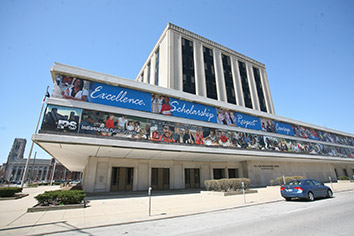Subscriber Benefit
As a subscriber you can listen to articles at work, in the car, or while you work out. Subscribe NowIndianapolis Public Schools officials voted Tuesday to ask taxpayers for $315 million over eight years to help close its budget gap—an amount that’s only about a third of the district’s initial proposal but is still high enough to draw concern from a local business group.
The school board pledged to continue discussions in the next week with the Indy Chamber, which released an alternative proposal last week calling for massive spending cuts and a significantly smaller tax increase. The chamber consulted with the district on a four-month operational analysis before releasing the plan, but the school board rejected the proposal as unrealistic and instead voted to add a much larger tax request that will come in a referendum on the November ballot.
If the school board and the chamber come to a different agreement before the July 24 meeting, the board can change the request before it goes to voters. Some board members, however, were dubious that they would be able to find common ground.
“While I appreciate the fact that we want to continue to negotiate, I’m pretty sure that I’m at rock bottom now,” said board member Kelly Bentley. “That initial proposal by the chamber is, unfortunately in my mind, it’s insulting. It’s insulting to our children, and to our neighborhoods, and to our families."
Chamber leaders, whose support is considered important to the referendum's success, were skeptical about the dollar amount. In a press release, the group said the district was “taking another step toward seeking a double-digit tax increase.”
“We’re concerned that our numbers are so divergent,” said chamber president and CEO Michael Huber in the statement. “We need to study the assumptions behind the $318 million request; clearly the tax impact is significant and the task of winning voter support will be challenging.”
The chamber released an analysis that called for $477 million in district-wide cuts, including eliminating busing for high school students, reducing the number of teachers, closing schools, and cutting central office staff. The recommendation also included a $100 million tax increase to fund 16 percent raises for teachers.
District officials, however, say the cuts proposed by the chamber are too aggressive and cannot be accomplished as quickly as the group wants. The administration and board members spent nearly an hour of the meeting Tuesday discussing the chamber plan, why they believe it’s methodology is wrong, and the devastating consequences they say it would have on schools.
During the board meeting, which lasted more than two hours, district leaders discussed why schools need more money and why the chamber report is unrealistic. They also took comments from community members who were largely supportive of a larger tax increase.
Joe Ignatius, who mentors students through 100 Black Men of Indianapolis, said that he has seen the benefits of more funding from referendums in other communities.
“This should be a no-brainer, to invest in our future for the students,” Ignatius said. “Don’t think about the immediate impact of the dollars that may come out of your pocket but more the long-term impact.”
If the district goes forward with its plan, and voters approve the tax increase, the school system would get as much as $39.4 million more per year in funding for eight years. A family with a home at the district’s median value—$75,300—would pay about $3.90 more per month in property taxes. Since the initial proposal, the district has reduced the median home value figure used in calculations on the advice of a consultant. Earlier estimates listed the median home price in the district at $123,500.
The district plan comes on the heels of months of uncertainty. After the school board abandoned its initial plan to seek nearly $1 billion for operating expenses and construction, district officials spent weeks working with the Indy Chamber to craft a less costly proposal. Last month, the board approved a separate referendum to ask taxpayers for about $52 million for school renovations, particularly school safety features.
But the groups came to different conclusions about how much money the district needs for operating expenses.
Even if the $315 million plan proposed by the district passes, it will come with some sacrifices compared to the initial plan. Those cuts could include reduced transportation for magnet schools, field trips and after-school activities; school closings; increased benefits costs for employees; and smaller pay increases for teachers and employees.
The district did not make a specific commitment to how much teacher pay would increase if the amount asked for in the referendum is approved, but Superintendent Lewis Ferebee said the funds would pay for consistent raises.
“We would be at least addressing inflationary increases and cost of living, but we hope that we can be higher than that,” said Ferebee. “It would depend a lot on what we are able to realize in savings.”
The school board’s decision to rebuff the chamber’s recommendation puts the district in a difficult position. The chamber has no official role in determining the amount of the referendum, but it could be a politically powerful ally.
Last week, Al Hubbard, an influential philanthropist and businessman who provided major funding for the chamber analysis, said that if the district seeks more money than the group recommended, he would oppose the referendum.
The total tax increase would vary for each homeowner within district boundaries. The operating increase would raise taxes by up to 28 cents for every $100 of assessed property value, while the construction increase would raise taxes by up to 3 cents per $100 of assessed property value.
Chalkbeat is a not-for-profit news site covering educational change in public schools.
Please enable JavaScript to view this content.

